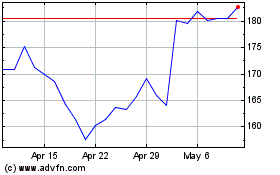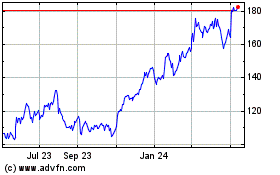Intel to Stop Making Modem Chips for 5G Smartphones -- Update
17 April 2019 - 12:49PM
Dow Jones News
By Asa Fitch
Intel Corp. dropped plans to make modem chips for 5G
smartphones, it said Tuesday, hours after its chief rival in that
market, Qualcomm Inc., resolved a yearslong legal dispute with
Apple Inc.
The decision by Intel removes a major rival to Qualcomm for a
critical component in the new generation of mobile handsets
expected to dominate the market over the next several years. It
followed a settlement between Qualcomm and Apple, which has been
Intel's biggest customer for smartphone modem chips. That
settlement includes a multiyear deal for Qualcomm to supply Apple
with modems, a major reversal after the iPhone maker shifted to
Intel as its sole supplier for those chips after years of using
Qualcomm.
Intel's withdrawal, meanwhile, leaves only a handful of
competitors to Qualcomm for 5G modems, which are small chips that
manage connection and the transfer of data between smartphones and
cell towers. Only a few other companies have 5G modems in the
pipeline, including Taiwan's MediaTek Inc., which supplies many
Chinese smartphone makers. China's Huawei Technologies Co. and
South Korea's Samsung are also developing 5G modems for their own
handsets.
Intel declined to comment on whether its announcement was
related to news of the Apple-Qualcomm deal.
In a statement, Chief Executive Bob Swan said that while Intel
is excited about 5G, in the modem business, "it has become apparent
that there is no clear path to profitability and positive returns."
He added that the new generation of wireless technology remains a
strategic priority, and that Intel is "assessing our options to
realize the value we have created" in 5G, including opportunities
with other devices and platforms.
Intel could sell the business, although it isn't clear who would
buy it, said Srini Pajjuri, an analyst at Macquarie Research.
Without a customer like Apple in place and with regulatory scrutiny
of any transaction, the proposition may not look attractive.
"They could look to sell, but I don't know if there are many
buyers out there," he said.
Investors and analysts had long looked askance at Intel's
smartphone modem business because profit margins were weaker than
its other businesses even though it brought in revenue. Angelo
Zino, an analyst at CFRA Equity Research, estimated that the
division produced gross margins of around 40%, compared with more
than 60% for other product segments.
"Intel benefits longer-term because now they can focus on
higher-margin, more profitable businesses and take their foot off
supplying Apple's iPhone business, which at the end of the day
wasn't a great business for them," he said.
Intel shares rose 4% to $58.97 in after-hours trading following
its announcement. The shares had closed up 0.76% in regular trading
Tuesday.
Intel's move illustrates Mr. Swan's approach to leading Intel,
which takes a hard look at whether the company's many ventures make
financial sense. Mr. Swan, who was Intel's chief financial officer
and then acting CEO until taking the helm permanently in January,
was "looking at the business differently and looking at where the
real opportunities lie," Mr. Zino said.
Intel has worked for years to build up its wireless business. It
plowed millions of dollars into developing smartphone chips under
previous CEO Brian Krzanich, who touted 5G and mobile technology as
a big new revenue stream for a company that has long dominated the
computer-processor market.
The company won a deal to supply modems for some of the iPhones
Apple started selling in 2017. It became Apple's sole supplier of
modem chips, starting with the iPhone XR that was launched last
year, amid worsening tension between Apple and Qualcomm.
But Intel got a late start when it came to 5G and hasn't been
able to keep pace with rivals like Qualcomm. Mr. Krzanich's abrupt
departure last June for violating company policy by having a
relationship with an employee left the future of the modem
initiative uncertain.
Intel had expected to start sending sample 5G modem chips to
customers in the second half of this year and put them into
production next year before dropping those plans on Tuesday.
Qualcomm, by contrast, is already working on its second-generation
5G modem.
--Tripp Mickle contributed to this article.
Write to Asa Fitch at asa.fitch@wsj.com
(END) Dow Jones Newswires
April 16, 2019 22:34 ET (02:34 GMT)
Copyright (c) 2019 Dow Jones & Company, Inc.
QUALCOMM (NASDAQ:QCOM)
Historical Stock Chart
From Mar 2024 to Apr 2024

QUALCOMM (NASDAQ:QCOM)
Historical Stock Chart
From Apr 2023 to Apr 2024
